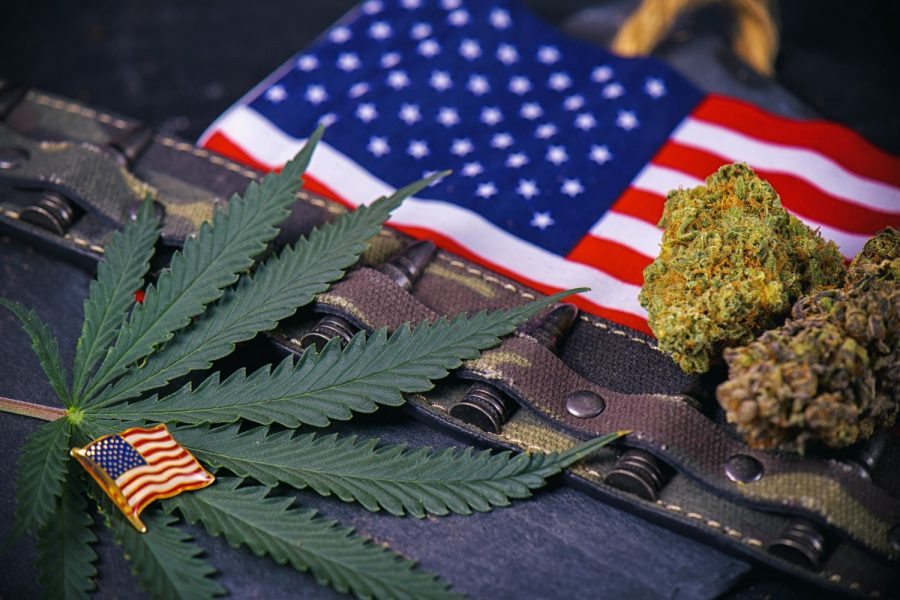Federal prohibition is preventing research into medical cannabis for Veterans, forcing them to turn to opioids
Two-thirds of U.S. military veterans claim to suffer with chronic pain, but federal prohibition is standing in the way
Since 2001, over 2.7 million male and female veterans have been deployed to Iraq and Afghanistan. Data from the Department of Veterans Affairs (VA) claims that 20 percent of veterans are likely to return from combat zones with Post-Traumatic Stress Disorder (PTSD).
The Veterans Administration published a seminal report in 2017, suggesting that an average of twenty veterans die by suicide every single day. Based on anecdotal evidence, a large number of veteran deaths are also directly linked to opioid overdoses; something that wouldn’t be such a problem if medical cannabis was made legal at the federal level.
Compared to the rest of the population, veterans are twice as likely to die from an opioid overdose, according to a Veterans Affairs study. Unfortunately, federal prohibition makes it difficult for veterans to access medical cannabis as an alternative to opioids. Since cannabis is classified by the Food and Drug Administration (FDA) as a Schedule I substance, VA healthcare providers are currently unable to recommend medical cannabis or assist veterans in gaining access to it.
Despite the fact that legalization is unfurling across the U.S., cannabis research is still stifled by obstacles, with the Drug Enforcement Administration (DEA), FDA, and the National Institute on Drug Abuse all requiring researchers to apply for approval in order to execute their research.
The cannabis research application process is not as streamlined as the DEA likes to think. For the past decade, Dr. Sue Sisley has been trying to conduct the first clinical trial on the effects of using cannabis for treating veterans with post-traumatic stress disorder (PTSD). Finally, eight years after the Food and Drug Administration (FDA) approved the study back in 2011, the study was carried out and sponsored by the non-profit Multidisciplinary Association for Psychedelic Studies (MAPS).

Upon completion earlier this year, Dr. Sisley rejoiced, along with the families of veterans who are hoping that the federal government changes its stance on medical cannabis. After all, it is emerging as a potentially effective treatment for ex-servicemen, with numerous studies demonstrating the therapeutic effects of the plant’s active chemical compounds.
Studies like Dr. Sisley’s can inform, educate and raise awareness about the benefits of legalizing weed for veterans. She hopes to gather preliminary data by this summer.
In the meantime, federal prohibition and lack of research is preventing veterans from being able to legally procure pharmaceutical-grade weed to treat the symptoms of PTSD.
“We are immensely grateful to all of the study’s supporters and especially the veteran service organizations who helped us with patient recruitment,” she wrote in a press release confirming the study’s completion, adding that she and her team “are proud to have persevered through these regulatory hurdles independently of hospitals, universities, or the VA system.”
Dr. Sisley’s study signifies an outlier for research into the plant’s use as a treatment for veterans. The U.S. Department of Veterans Affairs is not on board with the idea quite yet, however. A statement published on the official website reads as follows:
“Marijuana use for medical conditions is an issue of growing concern […] There is no evidence at this time that marijuana is an effective treatment for PTSD. In fact, research suggests that marijuana can be harmful to individuals with PTSD.”

While there is no evidence at this time that cannabis is an effective treatment for PTSD, the VA claims that two out of 10 people with the condition use weed to relieve their symptoms. Currently, the VA is not allowed to prescribe cannabis to veterans, in spite of the fact that the plant boasts numerous therapeutic properties.
Regardless, this doesn’t change the fact that over a third of patients who apply for medical cannabis claim PTSD is the main reason for applying. What’s more, two-thirds of U.S. military veterans claim to suffer with chronic pain, according to the National Center for Complementary and Integrative Health (NCCIH).
Chronic pain is one of the conditions that cannabis is effective at treating. However, lack of access to medicinal cannabis means that veterans are left with no choice but to use opioids or turn to the black market.
“More than two million veterans report using cannabis to treat their service-connected injuries according to surveys; anecdotally, hundreds of veterans have publicly testified that cannabis access has saved their lives after being driven to near-suicide under a pharmaceutical load of dozens of pills a day,” the CEO and Founder of Veterans Cannabis Coalition, Eric Goepel, told Forbes.
In 2018, five studies regarding veteran PTSD and medical cannabis use were reviewed by a team of researchers. They discovered that “conflicting data exist for the use of marijuana for PTSD,” mainly, due to the fact that, “current evidence is limited to anecdotal experiences, case reports, and observational studies.”
Until the V.A. – and the federal government – change their prohibitionist approach, veterans may be forced to choose pills over pot.








